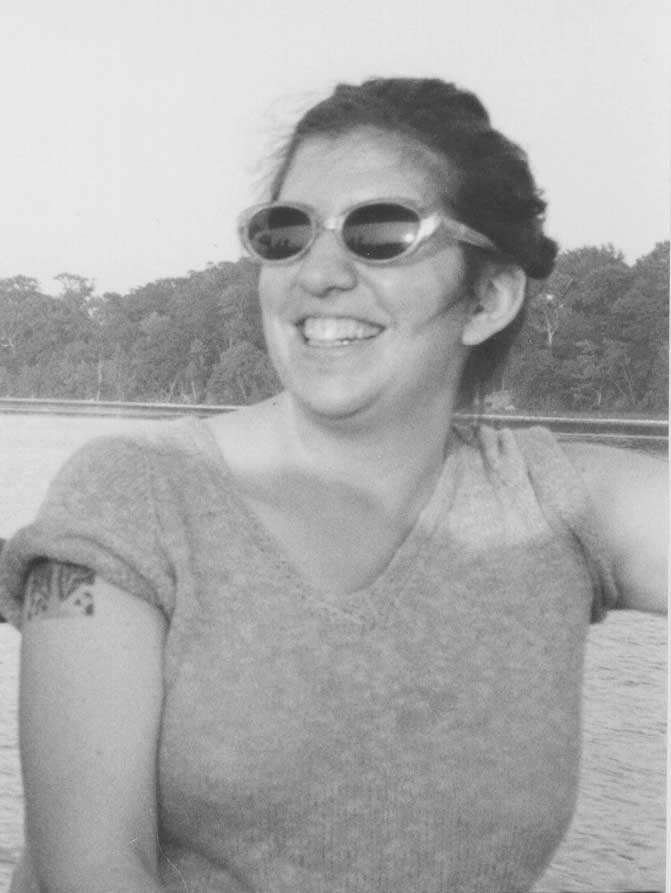Empowering Jewish Progressives:
An Interview with JFREJ Director Dara Silverman
Dara Silverman, the Director for Jews for Racial and Economic Justice (JFREJ), has dedicated the past decade of her professional life to supporting under-represented communities in their fight against systemic oppression. Her background in social justice and community organizing ranges from working on living wage campaigns, advocating for fair public housing and education for immigrant communities, and empowering others to speak out effectively about corporate globalization, welfare reform, and the needs of their own communities.
In many ways, Dara's work is rooted in the Jewish tradition's obligation to pursue justice-an idea that was embedded in the court system of ancient Israel and continues to serve as a strong undercurrent in Jewish thought today. This connection, however, was not always apparent to Dara, who was raised in a non-religious household. Dara says that her two sociology professor parents were, "very radical and huge mentors to me, but not so much in spiritual life."
 It was not until she began to regularly work overtime for an organization called Neighbor to Neighbor that Dara began to identify her need to find a more solid foundation for her work. "At a certain point I was just so exhausted and drained, I would be crying on my way to work. When I left that job I said, "I never want to be in that place again where I'm so disconnected from my core self that I can't understand when I'm overstretched." Although Dara didn't have a spiritual practice at that time, she felt her Jewish heritage was the place to begin a search for personal and professional meaning.
It was not until she began to regularly work overtime for an organization called Neighbor to Neighbor that Dara began to identify her need to find a more solid foundation for her work. "At a certain point I was just so exhausted and drained, I would be crying on my way to work. When I left that job I said, "I never want to be in that place again where I'm so disconnected from my core self that I can't understand when I'm overstretched." Although Dara didn't have a spiritual practice at that time, she felt her Jewish heritage was the place to begin a search for personal and professional meaning.
In 1997 Dara joined the Jewish Organizing Initiative, a social action fellowship based in Boston. Through JOI, she was able to continue her work with Neighbor to Neighbor, while developing a supportive community of Jewishly-engaged activists. She also began to discover the connections between her work and her religious tradition: Tikkun Olam, and the mandates within Judaism to do social justice work.
Dara has continued to deepen and strengthen those connections. She helped to found another Boston-based group, Tekiah: A Jewish Call to Action, which draws connections between the experiences of Jewish families that immigrated to America a few generations ago and immigrant families today.
In February, 2004, Dara joined JFREJ. I recently spoke with her in JFREJ's sun-lit offices. As we spoke, Dara's passion for her political work and its "inextricable link" with Judaism were evident. It seems that on her path of empowering others to find their voice, she has found her own as well.
LK: Let's start out with an overview of JFREJ's vital signs. Would you give a summary of JFREJ's mission and history as a social justice organization?
DS: JFREJ was founded fourteen years ago and our mission is to be a progressive voice in Jewish communities and a Jewish voice in progressive communities. The goal of that is really to bring Jews into the street in solidarity with other targeted communities-low income, people of color, immigrants, queer and transgender people. The other piece is that we're working to hold the established Jewish community accountable for their policies and for their rightward shift. One of the first actions that we did was when Nelson Mandela was coming to the United States for the first time. The established Jewish communities would have nothing to do with him because he had made some statements about Israel. So we had a welcoming reception for him and raised money for the African National Congress.
Despite that start, our focus is primarily local. Our campaigns have been on things like being a part of the Coalition Against Police Brutality. We've worked really closely with a number of groups around the city, particularly around the shooting of Amadou Diallo and the trial and verdict surrounding that. After the verdict of that trial came out we organized over fifty rabbis to get arrested on the steps of city hall. We also worked with the Alliance for Quality Education when the Edison Corporation wanted to privatize schools in Brooklyn and the Bronx--bringing out Jewish teachers, parents and students to fight for the right for all students to have a public education.
Our other primary campaign focuses on building relationships with Jewish immigrant communities, because about a third of the Jews in New York are immigrants. We're making the connection between non-Jewish immigrants and the effects of September 11th and Jewish immigrant communities where there are a lot of similar effects.



Empowering Jewish Progressives
Leah Koenig
Deconstructing Zell Miller (and Reconstructing Kerry)
Jay Michaelson
A Demonstration in Words
Hila Ratzabi
Where Left and Right Collide
a debate
moderated by
Dan Friedman
Art at War
Bara Sapir
Jews and Bush
An Online Resource Guide
Belly of the Beast
Cullen Goldblatt
Archive
Our 550 Back Pages
Zeek in Print
Spring/Summer 2004 issue now on sale!
About Zeek
Mailing List
Contact Us
Subscribe
Tech Support
Links
From previous issues:
Mourning in America
Samuel Hayim Brody
The Red-Green Alliance
Dave Hyde
Some things have changed, some have stayed the same
Jay Michaelson